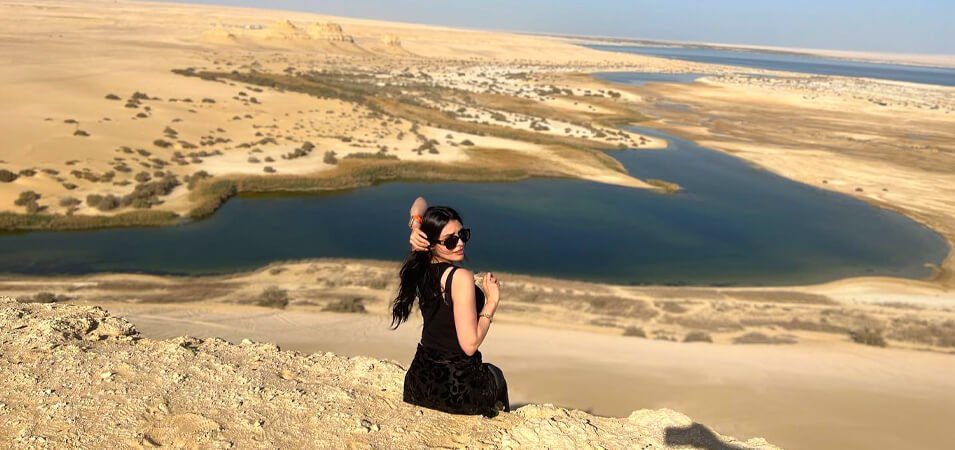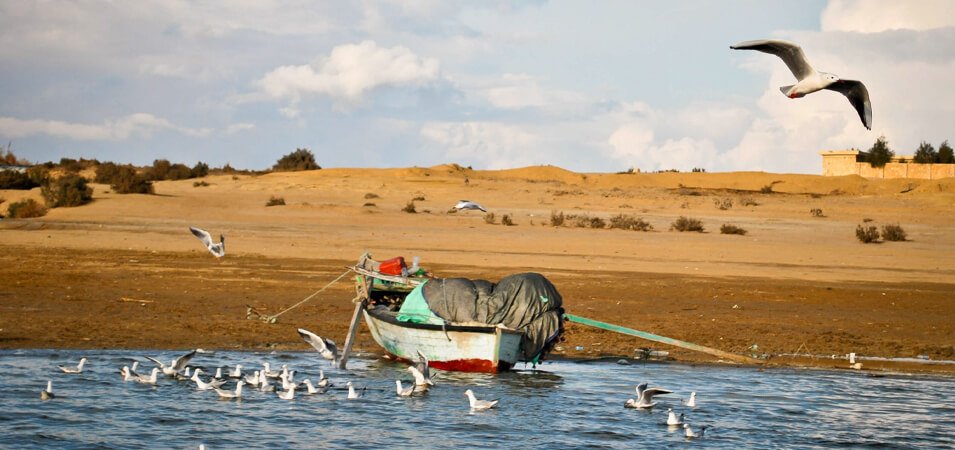Located just 100 kilometers southwest of Cairo, Fayoum Oasis is a hidden gem that combines natural beauty, historical significance, and cultural richness. With its lush landscapes, tranquil lakes, and vast desert views, Fayoum offers a peaceful escape from Egypt’s busy cities. It’s an ideal destination for those seeking both relaxation and adventure.
The oasis is steeped in history, with traces of ancient Egyptian civilization that date back over 4,000 years. Visitors can explore ancient ruins, vibrant local culture, and a landscape shaped by centuries of tradition.
Fayoum is perfect for outdoor enthusiasts, offering activities like hiking, birdwatching, and exploring historical sites. At the same time, its serene lakes and desert surroundings make it a peaceful retreat for those looking to unwind.
The Rich History of Fayoum Oasis
Origins and Ancient Significance
Fayoum Oasis is one of Egypt’s oldest regions, with a history dating back thousands of years. Known as “The Oasis of the Lake,” it was vital to ancient Egyptian agriculture, especially during the Pharaonic, Ptolemaic, and Greco-Roman periods. The fertile land, fed by Lake Moeris (now Birket Qarun), played a crucial role in Egypt’s irrigation system.
During the Ptolemaic and Roman eras, Fayoum thrived as a cultural and agricultural hub. One of the region’s most important discoveries is the Faiyum Portraits, detailed Roman-era portraits on wood that offer a rare look into ancient life.

Fayoum’s Role in Modern Egypt
Today, Fayoum remains an agricultural center, known for producing wheat, rice, and cotton, using irrigation methods passed down through generations. The oasis has grown into a blend of ancient practices and modern lifestyles, where farming traditions continue alongside contemporary Egyptian culture.
Fayoum’s mix of ancient heritage and modern development underscores its ongoing importance to both Egypt’s past and present.
Natural Wonders of Fayoum Oasis
Lake Qarun: Egypt’s Oldest Lake
Lake Qarun, one of the oldest lakes in Egypt, is a central natural feature of Fayoum Oasis. Stretching across an area of over 200 square kilometers, it is a vital ecological hub, home to a diverse range of bird species, including migratory birds that stop here during their seasonal journeys. The lake’s serene environment makes it a perfect spot for activities like bird watching, fishing, and simply relaxing by the shore. The lake’s calm waters, set against the backdrop of desert landscapes, offer a peaceful retreat for nature lovers and visitors seeking tranquility.
Wadi El Rayan: A Twin Miracle
Wadi El Rayan is a stunning oasis within Fayoum, famous for its two man-made lakes and spectacular waterfalls. Created in the 1970s to help control water flow and protect the region from floods, the lakes have become a major eco-tourism attraction. The cascading waterfalls are a rare sight in Egypt’s arid landscape, making Wadi El Rayan a true natural wonder. The area is a haven for wildlife, including rare species of birds, reptiles, and mammals. It’s also an excellent destination for eco-tourism, with opportunities for hiking, photography, and exploring the rich biodiversity of the region.
Valley of the Whales (Wadi Al-Hitan)
Wadi Al-Hitan, or the Valley of the Whales, is one of the most significant paleontological sites in the world and a UNESCO World Heritage Site. This remote valley is home to an extraordinary collection of fossilized remains of ancient whales that date back to around 40 million years ago. The area offers a fascinating glimpse into Earth’s prehistoric past, where visitors can walk among the fossilized remains of these ancient sea creatures. The site is not only a geological marvel but also a key area for research into the evolution of whales and marine life. Wadi Al-Hitan’s fossil deposits have made it a vital destination for those interested in paleontology and natural history.
Must-Visit Attractions in Fayoum Oasis
Tunis Village: Art and Pottery
Tunis Village is a charming destination renowned for its vibrant artisan community and world-famous pottery. This small village has become a cultural hotspot, attracting artists and visitors from around the globe. Tunis is celebrated for its handmade ceramics, which are often inspired by ancient Egyptian motifs and modern artistic designs. Visitors can explore the village’s pottery workshops and even participate in hands-on pottery-making experiences, learning from skilled local artisans. The village also features art galleries and cozy cafes, offering a perfect blend of creativity and tranquility in the heart of Fayoum.
Kom Oshim and Other Archaeological Sites
Fayoum is rich in historical landmarks, and Kom Oshim is one of its most fascinating archaeological sites. This ancient area is home to ruins dating back to the Roman and Pharaonic periods, offering visitors a glimpse into Egypt’s early civilizations. The site features Roman-era temples, including remnants of an ancient Egyptian structure dedicated to the god Sobek. Kom Oshim is just one example of the many ancient ruins scattered throughout Fayoum, which also include remnants of Greco-Roman settlements and Egyptian structures, making it a must-visit for history enthusiasts.
Desert Adventures
For those seeking adventure, Fayoum’s vast desert landscapes provide the perfect playground. The oasis is home to dramatic sand dunes that are ideal for desert safaris, whether you prefer to explore by camel, 4×4, or quad bike. The surrounding desert offers opportunities for thrilling activities like dune bashing, stargazing, and sandboarding. Camel riding is a particularly popular way to experience the vastness of the desert, while quad biking allows for an adrenaline-packed adventure across the sands. Fayoum’s desert adventures promise to be unforgettable for thrill-seekers and nature lovers alike
Activities and Experiences in Fayoum Oasis
Bird Watching and Wildlife Spotting
Fayoum Oasis is a birdwatcher’s haven, with key spots like Lake Qarun and Wadi El Rayan attracting a variety of bird species, especially migratory ones. During spring and autumn, the area sees large numbers of pelicans, herons, and ibises. The best times to visit are during migration periods, and nature reserves around the lakes offer prime opportunities for spotting local wildlife, including gazelles and wild boars.

Culinary Delights of Fayoum
Fayoum’s cuisine is a feast for the senses, featuring dishes made with fresh, local ingredients. Fish from Lake Qarun is a must-try, along with traditional dishes like moussaka, koushari, and fatta. Sweet treats such as baklava and basbousa add a delicious finish to any meal. Local markets and village eateries offer an authentic taste of Fayoum’s culinary heritage.
Cultural and Artistic Exploration
Fayoum is rich in culture and art. The village of Tunis is famous for its pottery, where visitors can watch artisans at work or join workshops. Local galleries showcase the region’s artistic talent, blending ancient influences with modern creativity. Fayoum also hosts traditional festivals, such as Moulid El-Sheikh Ibrahim, offering a glimpse into its vibrant cultural life.
Tips for Visiting Fayoum Oasis
Best Time to Visit
The ideal time to explore Fayoum Oasis depends on your activities and the type of experience you’re seeking.
- October to April: The weather is mild, perfect for outdoor adventures like desert safaris, bird watching, and exploring historical sites. These months offer the best climate for walking, hiking, and camping in the desert.
- Spring (March to April) & Autumn (September to November): These months are especially beautiful for witnessing migratory birds and enjoying the natural landscape of Fayoum. The weather is neither too hot nor too cold, making these ideal for nature lovers.
Tip: To avoid crowds, plan your trip outside of Egyptian national holidays and major school vacations, which are typically in July and August.
How to Get There
Fayoum is easily accessible from Cairo, and while there are several transport options, the most common and efficient are:
- Car: Distance Approximately 100 km from Cairo (around 1.5 to 2 hours by car).
- Bus: Available from major Cairo bus stations like Turgoman and El-Mahata. Travel Time About 2 hours, with several daily departures.
- Private Tours: A guided tour can offer a richer experience, as they often include a local guide who knows the region’s best attractions and hidden gems.
Accommodation Options
Fayoum offers a variety of accommodations to suit different preferences and budgets. Here’s a breakdown:
- Eco-lodges: Secluded locations, close to nature reserves (e.g., Tunis Village Eco-Lodge)
- Boutique Hotels: Modern amenities with a touch of local flair (e.g., Fayoum Paradise Hotel)
- Traditional Guesthouses: Authentic, family-run stays offering local experiences
- Luxury Resorts: Resort-style stays with lakeside views and luxurious amenities (e.g., Carlton Fayoum Hotel)
Conclusion
Fayoum Oasis is truly one of Egypt’s hidden gems, offering a unique blend of natural beauty, rich history, and vibrant culture. From the serene waters of Lake Qarun to the ancient fossils of Wadi Al-Hitan, the oasis provides an unforgettable experience for nature lovers, history buffs, and adventure seekers alike. Whether you’re exploring the area’s archaeological wonders, enjoying its stunning landscapes, or immersing yourself in local traditions, Fayoum promises a diverse and enriching escape from the ordinary.
Now is the perfect time to plan your visit to Fayoum Oasis. Whether you’re seeking relaxation, outdoor adventure, or cultural discovery, this enchanting destination offers something for every traveler. Don’t miss out on the chance to explore Egypt’s lesser-known treasure—Fayoum Oasis awaits!
